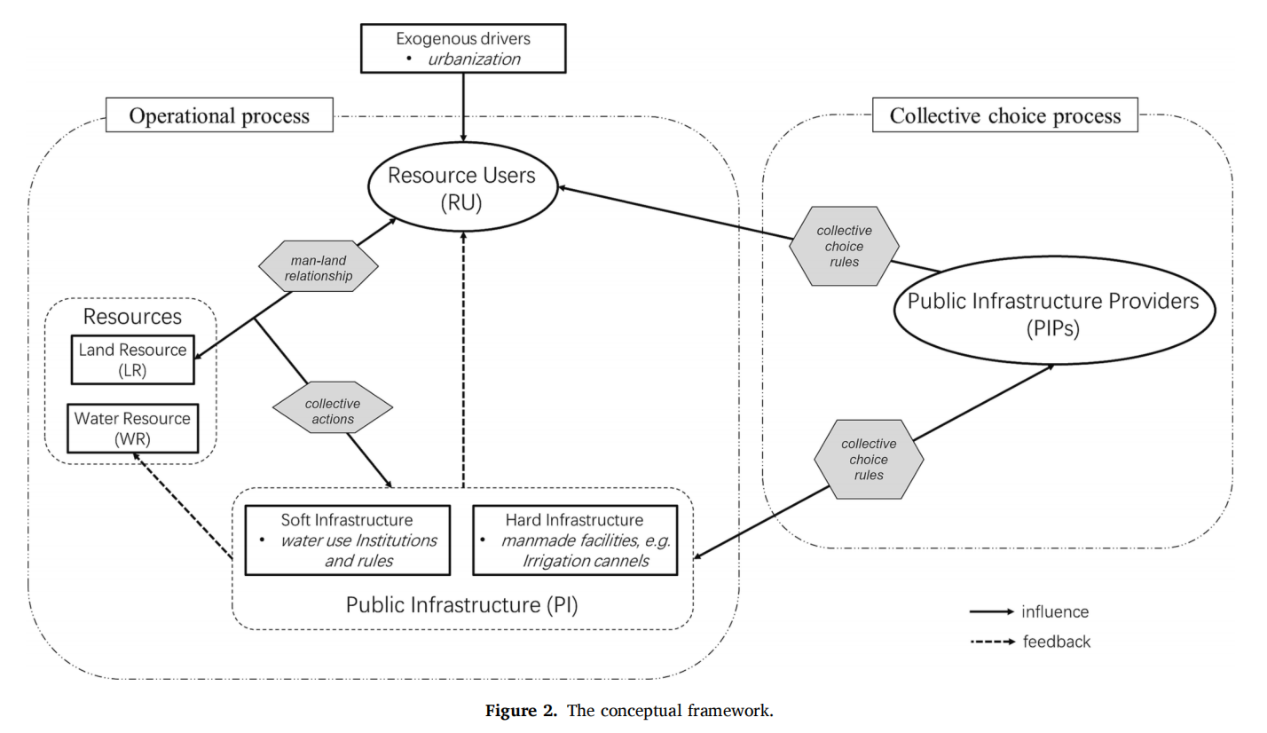Profile of the Authors
Su Yiqing - Associate Professor, School of Public Policy and Management, Guangxi University
Chen Xiaohan - Doctoral Student, School of Public Policy and Management, Guangxi University
Li Yanyan - Doctoral Student, School of Public Policy and Management, Guangxi University
Wang Yahua - Corresponding Author, Professor and Vice Dean, School of Public Policy and Management, Tsinghua University; Executive Dean, China Institute for Rural Studies
Published in
World Development
Citation
Yiqing, S., Chen, X., Li, Y., & Wang, Y.* (2024). The robustness mechanism of the rural social-ecological system in response to the impact of urbanization——Evidence from irrigation commons in China. World Development , 178: 106565. https://doi.org/10.1016/j.worlddev.2024.106565
Original Article Link
https://doi.org/10.1016/j.worlddev.2024.106565

Urbanization is a key pathway for developing countries to achieve modernization. The migration of labor from rural areas to cities during urbanization has greatly contributed to rural development worldwide, yet it has also led to crises in some rural regions. The rapid urbanization and subsequent rural decline have become pressing challenges for many developing countries. In this context, it is crucial to systematically analyze the internal dynamics of rural areas under the pressures of urbanization, to understand why some communities withstand external shocks and maintain stability, while others succumb to decline.
Recently, Su Yiqing, Associate Professor at Guangxi University's School of Public Policy and Management, together with doctoral students Chen Xiaohan and Li Yanyan, and Professor Wang Yahua from Tsinghua University's School of Public Policy and Management and the China Institute for Rural Studies, conducted a study on how to maintain the robustness of rural socio-ecological systems amidst urbanization. Their research, published in the prestigious journal World Development (SSCI indexed, 2023 IF = 6.9) under the title “The robustness mechanism of the rural social-ecological system in response to the impact of urbanization——Evidence from irrigation commons in China,” uncovers the underlying mechanisms that sustain the robustness of rural socio-ecological systems. The study provides theoretical insights and policy guidance for developing countries to maintain rural stability and ensure sustainable development in the face of ongoing urbanization.
The paper applies the coupled infrastructure system (CIS) framework, analyzing survey data from 123 villages across 18 provinces in China. It empirically explores the internal mechanisms of interaction within rural socio-ecological systems as they respond to urbanization, offering a deep examination of how these systems can remain resilient under external pressures, informed by China's rural governance practices.

Figure 1 The conceptual framework
The study uses IV-OLS regression and mediation effect analysis to carry out its empirical research. The findings reveal that under the pressures of urbanization, the internal interaction pathways that rural socio-ecological systems adopt at the operational level to maintain robustness are not limited to a single approach; theoretically, there are four potential pathways. Depending on the impact of urbanization, these different internal interaction pathways can either help maintain the robustness of rural socio-ecological systems or lead them towards gradual collapse.

Figure2 Fundamental forms of possible paths through which LM affects the PI and the robustness of rural social-ecological systems via FURT
Further research shows that under the pressures of urbanization, the rural areas whose socio-ecological systems remain robust do so via different pathways. Some villages achieve this robustness through self-regulation mechanisms, primarily relying on market forces and other self-adjusting processes. Other villages, despite poor operational performance, manage to sustain their socio-ecological systems' robustness through active intervention by external collective choice rules. In contrast, villages where socio-ecological systems collapse under urbanization typically lack a collective choice process. This suggests that the key to maintaining the robustness of rural socio-ecological systems amidst urbanization is to ensure that appropriate institutional rules are established through collective decision-making processes to support the operational level.

Figure 3 Interaction between operational and collective choice processes in rural socio-ecological systems
In this paper, the interaction between operational rules and collective choice rules is introduced as a theoretical lens in the analysis of socio-ecological systems, shedding light on the underlying mechanisms that help maintain the robustness of rural socio-ecological systems under urbanization pressures. This work enriches the understanding of rural development and governance patterns in the context of urbanization. The paper’s analysis of the interaction between operational and collective choice processes within rural socio-ecological systems highlights the need for effective governance that coordinates both internal and external forces to drive sustainable rural development. These findings offer valuable policy recommendations for the practice of rural revitalization.
This research was supported by the National Social Science Fund of China (22GBL225 & 22AZD050), the National Natural Science Foundation of China (71573151 & 71721002), the Tsinghua University High-End Think Tank Project (2020ZZBF0112), and the “Double High” Special Project for the Development of Humanities at Tsinghua University (2021TSG08204).
- Journal Overview -

World Development (WD) is a top-tier international academic journal in the field of development studies, with a 2023 impact factor of 6.9, ranked as a Q1 journal in the JCR. The journal aims to provide scholars, policymakers, and practitioners with cutting-edge research and insights on global development challenges. Its scope includes research in areas such as development economics, rural and urban development, environment and sustainability, poverty and inequality, education and health, gender and development, and globalization.

